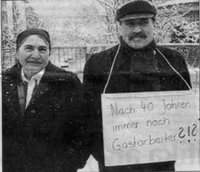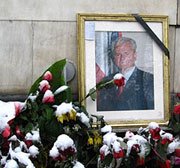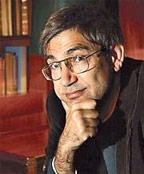
Turkish Prime Minister Recep Tayyip Erdogan has continued Turkey's pursuit of EU membership. But, in this commentary by our Turkey correspondent Dorian Jones, will the country every really warm to one of the most basic rights available to every EU citizen?
In a courtroom 5 of Turkey’s leading writers, columnists and editors faced up to 8 years in jail for articles they wrote. The controversy over freedom in expression in Turkey has returned with a vengeance.
Standing in the packed court among journalists, the defendant’s supporters and yes supporters of the prosecution, I had a rather depressing feeling of déjà vu. Over the last 12 years of reporting in Turkey I have lost count of the number of trials I have attended of people being prosecuted for what they wrote or said, whether it was writers, politicians, singers, journalists or political activists.
And this case is little different. One of the defendants, Professor Haluk Sahin, is well known to Turkey, presenting a weekly current affairs program as well as teaching media studies at Istanbul prestigious Bilgi University. For him, he says, it’s an occupational hazard, “It’s a part of being a writer in Turkey; writers have always been prosecuted or put in jail. I guess there is something in our culture that attaches more importance to words than deeds.”
In fact the court house which is locate close to many of the country’s leading newspapers and TV channels on the same day was hearing 12 other freedom of expression cases.
But such cases are meant to be a thing of the past. The European Union last year finally after decades of delay, in part due to human rights concerns finally gave the green light for the start of membership talks. Much praise has been bestowed by European leaders on the present government for the sweeping reforms introduced at break neck speed to meet EU standards.
But ironically these latest prosecutions were made under legislation introduced by the Turkish government last year to meet EU demands. Nearly all the latest cases including the world famous writer Orhan Pamuk fall under 301 of the penal code, which criminalizes statements, which undermine “Turkishness”
Critics of the law argue its vagueness makes it extremely difficult to determine what is illegal. Much of Turkish law dealing with freedom of expression over past decides has been similarly vague something critics argue is deliberate. It’s a tradition, which goes back centuries; not knowing where the legal line is drawn makes people err on the side of caution, self-censorship.
The government steadfastly refuses to amend the law arguing the fault lies with the judges and prosecutors who they say are misusing it. But it is the government which directly appoints prosecutors and judges, something the EU recently criticized calling for greater autonomy in the judicial system.
But for now the EU seems to be prepared to give the government the benefit of the doubt. Few of the cases result in prosecution and those that do are being appealed, and so far all have been overturned. But critics argue the mere threat of prosecution and ordeal of going to court is enough of a threat to deter people from fully expressing what they think.
 Tarantino produced this little bloodbath set in Slovakia. The Slovaks aren't crazy about the whole idea.
Tarantino produced this little bloodbath set in Slovakia. The Slovaks aren't crazy about the whole idea. 






